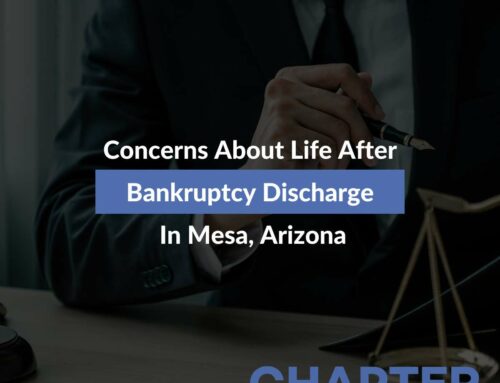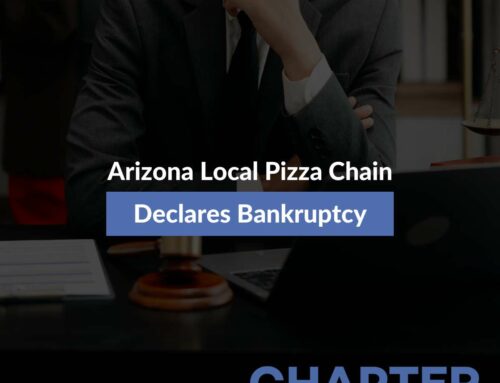Filing for bankruptcy can be a complex and life-changing decision, especially when dealing with divorce and family law matters in Phoenix and Tucson, Arizona. This blog aims to explore how filing for bankruptcy in Arizona can impact your divorce proceedings and highlight the various ways family law and bankruptcy intersect. Additionally, we will delve into specific concerns related to bankruptcy and child support issues.

Filing for Bankruptcy in Arizona: A Chapter Bankruptcy Overview
Bankruptcy is a legal process that allows individuals and businesses to eliminate or restructure their debts when they are unable to meet their financial obligations. In Arizona, as in other states, there are different types of bankruptcy, with Chapter 7 and Chapter 13 being the most common for individuals.
Chapter 7 bankruptcy involves liquidating assets to pay off debts, while Chapter 13 bankruptcy entails creating a manageable repayment plan over several years. Each type has its own eligibility criteria, advantages, and implications for your financial situation.
Bankruptcy Impact on Divorce Proceedings
Filing for bankruptcy in Arizona can significantly impact your divorce proceedings in several ways:
- Automatic Stay: When you file for bankruptcy, an automatic stay goes into effect. This legal injunction halts most collection actions, including divorce-related proceedings, such as property division and support orders. This stay can be both a relief and a challenge, as it temporarily suspends the divorce process, providing a breathing space to assess your financial situation.
- Property Division: Bankruptcy can complicate property division during divorce. Assets that would have been divided in a divorce proceeding might be subject to liquidation or protection in a bankruptcy case. The bankruptcy trustee may have authority over these assets, potentially affecting their distribution in the divorce.
- Debt Discharge: Bankruptcy can discharge certain types of debts, relieving you of the financial burden. However, not all debts are dischargeable, and this can affect the division of marital debt during divorce. Debts that are discharged in bankruptcy may no longer be eligible for division in the divorce.
- Spousal Support and Child Support: Bankruptcy does not discharge obligations related to spousal support (alimony) or child support. These obligations remain intact and must be addressed in both the bankruptcy and divorce proceedings. Failure to pay these obligations can have serious consequences.
Family Law Issues & Bankruptcy: The Intersection
Family law issues and bankruptcy often intersect in complex ways. Here are some common scenarios where the two areas of law may impact each other:
- Marital Debt: In a divorce, marital debt is typically divided between spouses. However, if one spouse files for bankruptcy and discharges their share of the debt, the other spouse may be left responsible for the entire debt.
- Property Division: The division of assets and property in a divorce may be affected if one or both spouses file for bankruptcy. Assets may be sold to pay off creditors, potentially altering the agreed-upon distribution of assets in the divorce settlement.
- Child Support and Spousal Support: As mentioned earlier, child support and spousal support obligations are not dischargeable in bankruptcy. These obligations must be addressed separately from bankruptcy proceedings.
- Bankruptcy Timing: The timing of filing for bankruptcy can be crucial. It may be more advantageous to file for bankruptcy before initiating divorce proceedings, especially if a significant portion of the debt will be discharged. However, this decision should be made with the guidance of an experienced attorney.
Bankruptcy & Child Support Issues
Child support is a critical obligation that cannot be discharged through bankruptcy. If you owe child support and are considering bankruptcy, here are some key points to keep in mind:
- Priority Debt: Child support is considered a priority debt in bankruptcy, meaning it takes precedence over other debts. The bankruptcy process does not affect your child support obligation.
- Income and Child Support: Bankruptcy can impact your income, which is used to calculate child support payments. Changes in income due to bankruptcy may necessitate a modification of your child support order. It’s essential to inform the court and the other parent of any significant changes in your financial situation.
- Child Support Arrears: If you owe child support arrears (unpaid child support), these arrears will not be discharged through bankruptcy. You will remain responsible for paying any outstanding child support amounts.
- Communication with the Court: It’s crucial to communicate with the family court and the child support enforcement agency if you are considering or have filed for bankruptcy. Failure to do so may lead to legal complications.
Contact Our Arizona Chapter Bankruptcy Attorneys for Assistance
Filing for bankruptcy in Phoenix and Tucson, Arizona, can have a profound impact on divorce and family law matters. The interplay between these areas of law is complex, and the decisions you make regarding bankruptcy can have long-lasting consequences on your financial and family situation. It’s essential to consult with Chapter Bankruptcy Lawyers who specialize in both bankruptcy and family law to navigate these challenges effectively.
Remember that child support obligations remain intact throughout bankruptcy proceedings, and other family law matters must be carefully considered to ensure your rights and responsibilities are properly addressed. Balancing the intricacies of bankruptcy and family law requires expert guidance, and seeking the counsel of legal professionals can help you make informed decisions and achieve the best outcomes for your unique circumstances. We offer free consultations, contact us through our online form or call us at 480-405-1010.
CHAPTER BANKRUPTCY LAWYERS
Mesa Office
3707 E Southern Ave
Mesa, AZ 85206
Phone: 480-405-1010
Email: [email protected]
Tempe Office
4500 S Lakeshore Dr #300
Tempe, AZ 85282
Phone: 480-562-6145
Email: [email protected]







